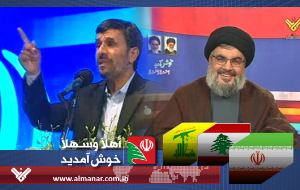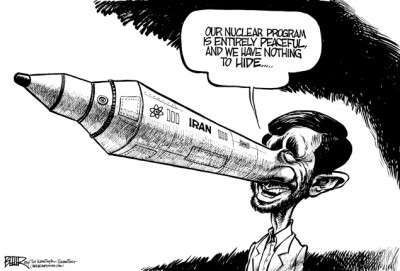
By : Amin Saikal
One of the explosive items disclosed by WikiLeaks so far is that Saudi King Abdullah has wanted the US to bomb Iran and ‘cut off the head of the snake’.
This disclosure has the potential to complicate what are already troubled regional relations in the Middle East. It may cause Iran either to accelerate its nuclear program towards military use or alternatively to cut a deal with the US to neutralise its Arab adversaries.
The Iranian Islamic regime has perennially been wary of many of the regional conservative Arab states, led by Saudi Arabia and Egypt, just as the latter have been deeply concerned about a perceived Iranian threat to the regional status quo. Of course, this is nothing new. It has its roots deep in historical, political, cultural, territorial and sectarian differences between the two sides. However, since the Iranian revolution of 1978/79, which resulted in the ‘loss’ of Iran as a vital strategic ally for the US and transformation of the country into an Islamic Republic, with an anti-American posture, these differences have taken a new dimension, namely the division of the region between Iran as the US enemy and most of the Arab states as US friends.
With Iran’s regional position strengthening largely because of American policy failures in the region, especially in relation to the Palestinian problem, and Iraqi and Afghanistan fiascos, and Tehran remaining adamant to develop a nuclear capability, Saudi Arabia and its allies, especially within the Gulf Cooperation Council (GCC), have become increasingly nervous. Tehran says its nuclear endeavours are for peaceful purposes, but the US and its allies suspect them to be for military use, which has made the GGC states to become ever more dependent on the US for their defence. The situation has reached a point where Iran is viewed as more of a regional menace than Israel – a country that Tehran has persistently castigated for its occupation of the Palestinian lands and for being a powerful ‘aggressive’ US ally in the region.
 Whilst Tehran and its Arab neighbours have sought to promote good relations, there remains mutual mistrust and suspicion. WikiLeak’s documents, highlighting the Gulf Arab states’ desire for the US to stop Iran’s nuclear program in its tracks, can only reinforce Tehran’s view that most regional Arab states are set against it.
Whilst Tehran and its Arab neighbours have sought to promote good relations, there remains mutual mistrust and suspicion. WikiLeak’s documents, highlighting the Gulf Arab states’ desire for the US to stop Iran’s nuclear program in its tracks, can only reinforce Tehran’s view that most regional Arab states are set against it.
The Iranian leadership is likely to be divided over how to deal with the situation.
The dominant group, involving the supreme leader, Ayatollah Ali Khamenei, president Mahmoud Ahmadinejad and the leadership of the powerful Revolutionary Guard, may now find it more desirable to press on with a military nuclear program as a deterrent in the same vein as North Korea.
On the other hand there are elements within the ruling clerics and Iranian government who are conscious of the strategic futility of a nuclear Iran, not least because it could make it a target of an Israeli nuclear attack. Some of them may be tempted to ponder whether the time may have come to cut a deal with the US on the basis of mutual needs and vulnerability. Washington needs Tehran’s help to bail it out of its difficult predicaments in Iraq, Afghanistan and Lebanon where Iran has built a considerable amount of anti-US leverage. Tehran could also assist the US with a resolution of the Palestinian problem by moderating its support for the Palestinian Islamist Hamas, which controls the Gaza Strip and the Lebanese Hezbollah, which has become a critical political and military force against Israel, as well as downgrading its strategic partnership with Syria. Tehran needs American support for securing the lifting of international sanctions, flow of foreign investment and technology to beef up its declining economy and to overhaul its dated oil facilities. Beyond this, a US-Iranian rapprochement will substantially weaken the position of the US Arab and Israeli allies, given the vital importance of Iran as a missing element in the US Middle East policy over the last 30 years.
Of course, this is precisely what some Arab states and Israel, as well as hardliners in both Tehran and Washington, may want to resist. The continuation of US-Iranian enmity can suit their domestic and regional purposes. On the other hand, if a US-Iranian deal is struck in a way which could alleviate the Israeli and Arab Gulf states’ concerns about Iran’s nuclear program, it would be the best stabilising development that the region has experienced since the Iranian revolution. Such a deal could come about especially if it is formulated within the context of a region-wide regime of arms control that could include Israel. The difficulties in reaching such a deal cannot be underestimated, but both sides have good reasons to work towards it now rather than later. Despite some of the heated rhetoric of president Ahmadinejad, the Iranian regime has proved to be capable of acting soberly and rationally when it is in the interest of the regime and Iran. The alternative to a US-Iranian rapprochement is more of what has continuously marred stability and security in a vitally oil-rich region of the world. To move beyond this, there is an urgent need for regional cooperation to overcome the traditional fault lines that have divided the Iranians and Arabs.
Amin Saikal is Professor of Political Science and Director of the Centre for Arab and Islamic Studies (the Middle East and Central Asia) at the Australian National University.

Leave a Reply
You must be logged in to post a comment.